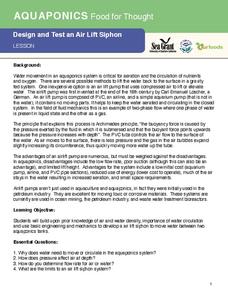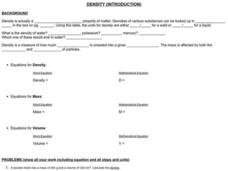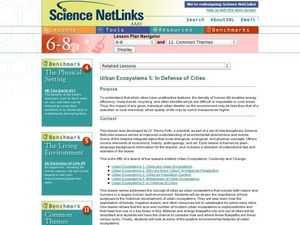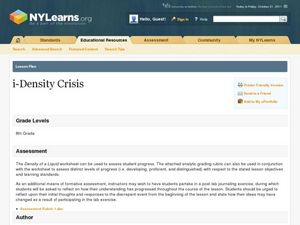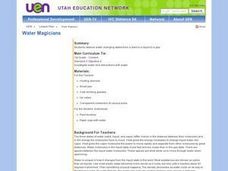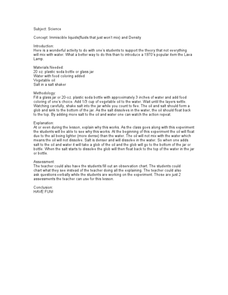Curated OER
Properties of Matter
Students investigate the properties of matter. In this properties of matter lesson, students observe containers of different metals and discuss their properties including density. Students find the density of an unknown metal and of...
Curated OER
It's The States of Matter
Students investigate the properties of solids, liquids and gases. In this states of matter lesson plan, students observe dry ice and its characteristics. They calculate the density of dry ice and observe the sublimation of the dry ice...
Curated OER
Dimensional Analysis Worksheet
In this dimensional analysis worksheet, students solve six word problems using dimensional analysis to solve for an unknown. These include finding density, and converting from one unit to another. They also categorize samples as...
Curated OER
Activity #19 The Density of Alka Seltzer Gas
Middle schoolers (teachers) complete the activity, they should not come in contact with Alka-Seltzer. They comprehend that the density of a gas can be calculated from its mass and volume. Pupils calculate the volume of gas generated by...
University of Chicago
Don't Be Too Flaky
Snow, ice, and water are all composed of H2O. Does that mean they all have the same volume? Discover the ways that the densities of these substances determine their volumes, and how they change based on their current states of...
University of Southern California
Design and Test an Air Lift Siphon
Build an air lift siphon using your mad physics skills! Learners first investigate the importance of circulating water in aquaponics systems. They then use density to their advantage as they engineer an air lift siphon
Teach Engineering
Aerogels in Action
Model an oil spill cleanup. An engaging engineering lesson has groups using aerogels to simulate an oil spill cleanup (vegetable oil in water). Along the way, they learn about nanotechnology and hydrophilia/hydrophobia.
Curated OER
Density Review
In this density worksheet, students review how to calculate density and how to apply Archimedes' Principle, Boyle's Law, and Charles' Law. This worksheet has 10 matching, 13 short answer, and 6 fill in the blank questions.
Curated OER
THE WONDERFUL WATER CYCLE
Students are introduced to the processes of evaporation and condensation as they observe physical changes in water. They observe how matter changes from a solid to a liquid state. Students are explained that steam is water in its gaseous...
Curated OER
Density
In this density worksheet, students review this property of matter and the mathematical equations for density, mass, and volume. The worksheet has 10 fill in the blank statements and 3 word problems.
Curated OER
Density Graph Questions
In this density worksheet, students use the mass of aluminum and copper at different volumes to create a graph in order to calculate the density of these metals. This worksheet has 1 graph, 2 short answer, and 5 word problems.
Curated OER
Introduction to Density
Seventh graders define density in their own words. In this physics lesson, 7th graders solve density problems using its mathematical formula. They explain why some objects flow and some sink.
Curated OER
Water and Ice
Students investigate what happens to solids and liquids when they change from one form to another. The amount od space taken by frozen water begins the discussion and students are led to formulate their own hypothesis to research.
Curated OER
i-Density Crisis
Eighth graders determine the density using mass and volume. For this science lesson, 8th graders explain why some materials float or sink. They estimate the density of objects based on whether it floats or sinks in a liquid of known...
Curated OER
Water Magicians
First graders observe water changing states from a solid to a liquid to a gas. They predict what they think happen to ice cubes as they sit out. They paint water with paintbrushes outside the classroom in the sun and watch the water...
Curated OER
Immiscible Liquids and Density
Students will make a lava lamp. In this density lesson, students will combine water and oil and make observations, then add salt to the oil and observe the oil sink, then float again when the salt dissolves in the water.
Curated OER
Density
Pupils work with a partner to record observations on various materials. Working together, they calculate the mass and volume of each material and then combine them and shake them for a period of time. In their journals, they record...
Curated OER
Investigating Density: Heavy Ice
Students end up learning the formula for density and calculate the densities of various materials, and predict if they sink or float.
Curated OER
Water Quality Monitoring
Students comprehend the four parameters of water quality. They perform tests for salinity, dissolved oxygen, pH and clarity or turbidity. Students comprehend why scientists and environmental managers monitor water uality and aquatic...
Curated OER
Chapter 12 Review, Mixed Review: Solutions
Although there are only six questions on this chemistry handout, it makes a thorough review of solutions. Novices explain why a compound is not an electrolyte, identify types of compounds, and calculate moles, grams, and molalilties in...
Exploratorium
The Dipping Bird
If you have or want to order the dipping bird demonstration, it is useful for showing how evaporation and changes in the pressure of a closed system cause cyclical motion. After teaching about pressure, consider setting this little guy...
Exploratorium
Bubble Suspension
Create a cushion of carbon dioxide gas to float some soap bubbles on. Many concepts can be demonstrated through this activity:
Carbon dioxide gas is more dense than air
Bubbles are semipermeable, allowing only carbon dioxide to diffuse...
American Chemical Society
Investigating the Line
Note that this lesson is best paired with the preceding lesson in the unit. In that lesson, elementary physical scientists observed that the color coating of M&Ms® candies do not mix when dissolved off of the chocolate surface. Now...
Curated OER
Not a Drop to Drink
Young scholars design an experiment to determine which liquid is water. In this chemistry lesson, students perform the experiment as outlined in their design. They record observation and formulate conclusion.







